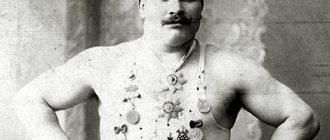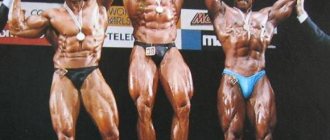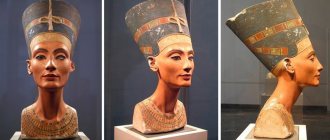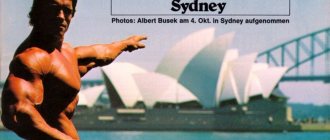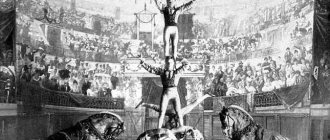“I came out in height and face, thanks to my mother and father...”
It’s as if he came out of the myths about Hercules or from the epics about Ilya Muromets.
The story of his life causes skepticism among many - well, this cannot be, it is implausible. He was born in the Russian Empire, shone in the arenas of Europe and America, survived the German occupation, and at the end of his life he was awarded the title of Honored Master of Sports of the USSR... How all this fit into the life of one person is incomprehensible to the mind.
But, having gone through difficult trials, having known great glory, having experienced love and betrayal, Ivan Poddubny remained the same as he was at the beginning - a hero with the innocence and naivety of a child.
Russian professional wrestler and athlete Ivan Poddubny. Photo: RIA Novosti
He was born on September 26 (October 8, new style) 1871 in the village of Bogodukhovka in the Poltava region, into a Cossack family.
The Poddubny family was famous for its physical strength and power, and Vanya took after his ancestors. But if he got strength and endurance from his father, then from his mother he got a keen ear for music. This subsequently amazed his contemporaries - this musicality did not combine with the appearance of a strongman.
The strength of the Poddubny family did not make them rich, so from an early age Ivan was introduced to hard physical labor, and from the age of 12 he worked as a farm laborer.
At the age of twenty, Ivan went to seek his fortune in the city. According to legend, the reason for this was unhappy love - a rich neighbor flatly refused to marry his daughter to the “starved man”.
The strong man Poddubny easily got a job as a port loader, first in Sevastopol, and then in Feodosia, and did not think about any other career.
Thirst for fight
As often happens, chance changed everything. of Ivan Beskaravayny came to Feodosia . An integral part of circus performances at the turn of the 19th and 20th centuries were performances by strongmen and wrestling matches. So the Beskaravayny circus had its own wrestlers, with whom everyone was invited to compete.
Ivan, confident that he would not yield to the strongmen from the circus, tried his hand and... unconditionally lost.
Was Poddubny the strongest? →
It was then that he realized that wrestling is not just a competition between people who are strong from birth, but a whole science.
Ivan was overwhelmed by excitement and the desire to prove that he could become the best.
He began to systematically train, study wrestling techniques, and soon again entered the circus arena, where he won several victories over famous athletes at that time.
After this, he was hired as a professional wrestler by Enrico Truzzi's circus. Thus, at the age of 27, the brilliant career of Ivan Poddubny began.
Like most wrestlers at that time, he combined several roles. Poddubny demonstrated strength tricks, for example, this one: a telegraph pole was placed on his shoulders, on which ten people hung on both sides and, as a result, as a rule, the pole broke. The audience gasped in delight.
But the main spectacle, of course, was the fight. All of Russia soon started talking about Poddubny, since he had no equal in traditional Russian belt wrestling.
Death
The last years of the celebrity's life were spent in poverty. The food rations that were given out in those years were not enough for the athlete’s body to function normally. He was forced to sell the awards, but they soon ran out. And after Poddubny broke his hip, he stopped leaving the house.
Posted by Tatyana Zakharina on Sunday, February 7, 2021
Grave of Ivan Poddubny
Ivan Maksimovich died on August 8, 1949, the cause of death was a heart attack. He was buried in a city park, where no one looked after the grave. Only when there was a fuss in the press did celebrities erect a monument. The inscription on the tombstone reads:
“Here lies the Russian hero.”
The judge is a scoundrel!
However, French wrestling, which was later called first classical and then Greco-Roman, was much more popular in the world. Poddubny switched to it, and in 1903 received an offer to represent Russia at the world championship in Paris.
The conditions of the tournament, in which 130 wrestlers took part, were very strict - the loser of at least one fight was eliminated. “Russian Bear” Poddubny stormed through 11 opponents until he met the idol of the French public, Raoul le Boucher.
The fight with the Frenchman almost turned Poddubny away from the fight forever. Fights at that time could last for several hours, until one of the opponents was laid to rest. The Frenchman, having failed to take Poddubny with the first onslaught, began to openly run from him. In addition, it turned out that he was coated with a fatty substance that prevented him from making grabs - this dishonest method, by the way, is still used by wrestlers. When Poddubny drew the attention of the judges to this, they only shrugged their shoulders. And after an hour of fighting, the victory was given to Le Boucher “for his beautiful and skillful avoidance of sharp techniques.”
This decision angered even the French public, and Poddubny, shocked by such dishonesty, wanted to end his wrestling career altogether.
Friends and colleagues had a hard time convincing the giant. But it must be said that, due to his character, Poddubny was extremely inconvenient for the organizers of wrestling matches - he basically did not conduct “fixed” fights and did not take bribes. Because of this, a couple of times his opponents even tried to organize the murder of Poddubny, but, fortunately, these plans fell through.
Why was Poddubny not an Olympic champion?
Le Boucher was rewarded at the international championship in St. Petersburg, where he again met with Poddubny. The revenge was cruel - the Russian wrestler twisted the Frenchman as he wanted. For twenty minutes he held his opponent, excuse me, in a knee-elbow position, while the audience whistled and hooted, until the judges took pity on Le Boucher. After this defeat, the French wrestler went into real hysterics.
Poddubny won the tournament, defeating another Frenchman, world champion Paul Pons, in the final in a two-hour fight.
Things were quite difficult with titles at that time. In professional wrestling, in one city or another, the tournament was declared a “world championship.” Poddubny won almost everywhere, but it is quite difficult to understand exactly how many times he was world champion.
But it is known that in the period from 1905 to 1908 he invariably won the most prestigious of tournaments - the World French Wrestling Championship in Paris.
At that time, the Olympics, which included wrestling, were already gaining popularity, but Poddubny’s way there was barred. The Olympics were then exclusively the domain of amateur athletes, and Poddubny was a professional.
“And with the personal... Well, just with the personal - hello...”
By 1910, the wrestler, who had won everything he could and earned a lot of money, was tired of the world of professional wrestling and decided to end his career. He left for his homeland, bought a house, land and began farming.
However, the businessman from Poddubny was useless, and besides, his wife’s demands quickly reduced his financial capital.
In general, the giant was catastrophically unlucky in love affairs. At the very beginning of his circus career, Poddubny fell in love with a 40-year-old Hungarian tightrope walker, an experienced and temperamental woman. Ivan was ready to marry her, but the Hungarian woman soon found herself a new boyfriend.
Then there was an affair with gymnast Masha Dozmarova. They were an amazing couple - a huge strongman and a fragile, almost ethereal girl. But on the eve of the wedding, a tragedy happened - Masha fell from under the circus big top and died.
Poddubny’s first wife was Antonina Kvitko-Fomenko, and it was she who squandered everything her husband earned, and at the height of the Civil War she completely ran away, taking with her some of her husband’s medals.
In 1922, Poddubny married the mother of the young wrestler Ivan Mashonin, Maria Semyonovna, and in this marriage he finally found personal peace.
Monument to Ivan Poddubny in Yeisk. Photo: Commons.wikimedia.org / Karachun
Movies
The image of the athlete is immortalized in cinema. Poddubny’s story became the inspiration for the film “The Fighter and the Clown,” which was released in 1957. Stanislav Chekan embodied the athlete in him.
In 2005, the premiere of the documentary film “The Tragedy of the Strongman” took place. Ivan Poddubny,” in which the creators talked about interesting facts from the life of the legend.
2014 was marked by the premiere of the biographical drama “Poddubny”, in which Mikhail Porechenkov played the main role. The plot covers 30 years in the life of a circus performer.
American voyage of the “Russian bear”
On the eve of the First World War, Poddubny, whose finances sang romances thanks to Antonina, returned to the circus and again began to win victory after victory.
Article on the topic
Why did Poddubny’s wife run away from him and why did the wrestler work as a bouncer in a bar? He also performed during the Civil War, although this time in his biography is perhaps the most mysterious page. Only one thing is known for sure - the simple-minded giant was too far from politics to join any of the parties, and at the same time he was equally warmly welcomed by whites, reds, and greens.
Already at the very end of the war in Odessa, Poddubny was almost shot by the Reds - the security officers confused him with the organizer of Jewish pogroms named Poddubnov, but, fortunately, they figured it out in time.
In 1922, Ivan Poddubny began performing at the Moscow Circus. Doctors examine the 51-year-old wrestler and shrug their shoulders - there are no complaints, his health is excellent.
In 1924, Ivan Poddubny received permission to go on a long tour of Germany and the USA.
Surprisingly, it’s a fact - the wrestler, who was well over 50, was in no way inferior to his rivals, who were old enough to be not only sons, but even grandsons.
In the USA, where the rules of wrestling were far from European and more like a street fight. Poddubny, however, quickly got used to it and continued to win, collecting full houses in Chicago, Philadelphia, Los Angeles, and San Francisco.
“The other day I had dinner with Poddubny - a man of enormous strength and the same stupidity,” - this description of the athlete was given not by anyone, but by the famous Russian writer Alexander Kuprin. The great wrestler was truly incredibly naive, which those around him took advantage of. When Poddubny, who was homesick, got ready to go home, the Americans actually deprived him of his earned fees - they say they remain somewhere in American bank accounts to this day.
Heritage
In his native village of Krasenovka, a monument to Ivan Piddubny was erected.[1] There is also the Ivan Piddubny Foundation, headed by Petro Dusheiko (former governor of the Chernobai region).[1] The Foundation sponsors the annual Bogatyr Strength festival, which has been going on since 1998.[1] The festival, which attracts up to 10,000 people, was once visited by the grandson and great-grandson of Ivan Piddubny, who came from Kazakhstan.[1]
- Poddubny Olympic College, the former Republican Higher School of Physical Culture (in Kiev) was renamed in 2015.
How Poddubny worked as a bouncer for the Germans
Nevertheless, in the USSR Poddubny was greeted as a hero. Upon his return, the wrestler announced that he had completed his career and would henceforth be engaged in the popularization of wrestling.
He announced, and... did not complete it. He fought his last fight on the wrestling mat in 1941, at the age of 70. History does not know another similar example of athletic longevity in this sport.
Article on the topic
"Poddubny". The true story of a Russian hero In 1939, 68-year-old Ivan Poddubny participated in the parade of athletes on Red Square, and in the same year he was awarded the Order of the Red Banner of Labor. Poddubny wore this award with pride, almost never taking it off, which a few years later almost cost him his life.
He settled in the small town of Yeysk on the shores of the Azov Sea. From many years of overload, his heart began to play tricks, but Poddubny did not turn to doctors, preferring traditional medicine. When the war began and the Germans occupied Yeisk, the wrestler refused to evacuate anywhere, saying that he had little time left to live and there was no point in running.
One day, a German patrol detained a middle-aged giant with a Soviet order on his chest on the street of Yeisk. The Nazis were taken aback by such impudence, but were even more taken aback when they found out who was in front of them.
Poddubny’s fame was so great that the occupiers did not touch either him or his award and, moreover, offered to move to Germany to train German athletes there.
If Poddubny had been more cunning, he probably would have thought before refusing, but the strongman immediately answered with a decisive “no.”
The Germans shrugged their shoulders and... left Poddubny alone. Moreover, in order for the strongman to earn a living, he was given a marker position in the billiard room.
Poddubny also worked as a bouncer in a bar for Hitler’s military.
This, of course, was complete surrealism: an elderly giant with a Soviet order on his chest with one hand throws the Fuhrer’s drunk soldiers out into the street. And the Aryans, who sobered up the next morning, run not to deal with the “Russian pig”, but to write a letter to their wife: “You know, dear, yesterday Ivan Poddubny himself threw me out onto the street!”
Bust of Ivan Poddubny in Yeisk. Photo: Commons.wikimedia.org / GennadyL
Ivan Poddubny. Facts and legends about the life of the great Russian wrestler
The Cossack family from which Ivan Maksimovich Poddubny came was known and famous in the Poltava region.
One of Ivan’s ancestors took part in the Battle of Poltava (the family always lived near Poltava), captured the Swedish banner and was awarded by Emperor Peter personally. The legend about this was kept in the family, passed down from generation to generation. All the Poddubnys were tall and strong people. They say that until the end of his life Poddubny was convinced that the only person who was stronger than him was his father. The Poddubnys were also famous for their health. Ivan's grandfather lived to be 120 years old. It is also known that Ivan was born with an excellent ear for music and voice. His date of birth is September 26, 1871. He had three brothers and three sisters. Poddubny’s first love was the daughter of a rich merchant, Alyonka Vityak, but the difference in class did not allow the lovers to marry.
Ivan’s entire childhood was spent in the fields doing hard physical work. Even then he showed enormous strength - while in amusing village battles, in wrestling with sashes. In his youth, Ivan fell in love with Alyonka Vityak, the daughter of a local rich man, for whom he worked as a sheep shepherd. The feeling was mutual, but it was difficult to imagine the two families becoming related. The external reason was the property situation between the Poddubnys and the Vityaks. True, Poddubny himself later said that Alyonka’s father came secretly to his father and told him that Alyonka was Ivan’s second cousin, therefore their marriage was impossible, and Ivan should be immediately sent somewhere far away so that he would not do anything stupid. In any case, Ivan Poddubny’s heart was broken for the first time, and he left for the sea.
Ivan Poddubny liked to say that his only trainer is “Mother Nature”
For several years, Poddubny worked as a port loader in Sevastopol and Feodosia. In the evenings, after a fourteen-hour workday, he and his friends trained, lifted weights, and wrestled. In the mornings, Poddubny went for a run and doused himself with cold water. It was the friends with whom he rented a house who told him what sports was and taught him basic training skills. In 1896, the famous Beskorovainy circus came to Feodosia. For three days Poddubny went to all the circus performances. He seemed to be carefully studying the tricks that athletes perform in the arena. Maybe that was the case, but there is a version that he went for the sake of a circus gymnast, forty-year-old Hungarian Emilia, who performed in a separate act. Every evening the athletes offered anyone who wanted to fight them in the arena and receive a reward if they won. They say that Poddubny decided to take part in the competition (“to rip,” as he said) precisely in order to hit the Hungarian. By that time, he had many love victories to his name, and this was supposed to be a resounding triumph. Fragment of the film “Poddubny” Having appeared on stage, Poddubny defeated all the circus athletes in a belt fight, except for the strongest, but this loss was simply deafening for him. Poddubny always took defeats very hard, but here there were two of them at once, because he could not hit the gymnast. Shocked by the loss, Poddubny began to train even more actively (he had two 32 kg weights and a 112 kg barbell) and soon quit his job at the port to get a job in the circus. He was a member of the troupe of the Italian Enrico Truzzi. There were legends about his numbers. It seems that he put a telegraph pole on his shoulders, ten people were hanging on both sides of it, and then the pole broke under their weight. It was 1898, the beginning of Ivan Poddubny's fame. By the way, there is a version that only then did he meet Emilia. In any case, besides him, she had many lovers, and with one of them she once ran away from the circus, and Poddubny’s heart was again broken.
Poddubny “gave the circus director some pasta to eat,” that is, he forced him to eat the contract.
The film “Poddubny” shows an episode of how Mikhail Porechenkov’s hero forces the circus director to eat a contract
Meanwhile, Poddubny was gaining more and more fame, and the reason was not his tricks with pillars, but his victories in circus wrestling. It was quite primitive and most often represented the same fight with sashes, but winning it was still not so easy. The fact is that this fight was similar to modern wrestling, that is, the winner was known in advance, and it had to be the main star of the circus. This means that you had to become a star, and victories came one after another. Poddubny’s artistry and charm helped him a lot in this, but the problem was that he did not want to play by these rules. Once, as they say, he even forced the circus director to eat a contract that he did not like - in circus circles this was called “letting him eat pasta.”
Before a battle, Poddubny always made the sign of the cross. And on the mat he was mercilessly cruel: he broke his opponents’ bones, knocked out his teeth on the floor, etc.
Poddubny refused to lose according to the script and wanted to fight for real. He became especially furious if the enemy tried to use a dishonest technique. Here there was no mercy to be expected; the unfortunate people were carried away unconscious from the arena. Poddubny’s cruelty was perceived very favorably by the public, he knew this and emphasized, sometimes theatrically, his mercilessness. Poddubny always tried to improve his wrestling technique. He added Caucasian and Tatar wrestling methods to his style. Experimented with diet. True, how exactly is not completely clear. Some say that he practically did not eat meat and did not drink vodka. Others - that he ate meat in large quantities and that he always didn’t mind drinking a glass of vodka and sipping it. He loved vinaigrette, ate a lot of vegetables and cereals, and drank up to several liters of milk a day. The main thing that everyone agrees on is the iron discipline of training, which Poddubny observed until his death, without making any concessions to himself. Poddubny received a stern letter from his father, where he condemned the clownish antics of his son, who runs around the arena in shameful tights, and even has affairs with gymnasts and not only. Meanwhile, the gymnast, as already mentioned, ran away, and Poddubny, who did not like being abandoned, in a difficult state of mind went to Kyiv, where his performances soon began to sell out. In Kyiv, he struck up a friendship with a guy who wanted to become a trainer and constantly rehearsed with animals. Here he met a new great love - gymnast Maria Gazmarova, she was a small girl and, as they say, next to Poddubny she seemed very tiny. The three of them spent a lot of time together, dreaming about the future. Poddubny felt absolutely happy, basking in love and glory.
During her first performance, a friend-trainer was killed by a lion, and the next day Gazmarova crashed during her performance.
All this happened before Poddubny’s eyes; at that time he was backstage and waiting for his turn to perform. Ivan Maksimovich plunged into deep depression, he even wanted to go home, but the circus contract did not allow this, and he began to seek solace in sports. He began to regularly visit the Kiev athletes' club, where many nobles and celebrities visited. Poddubny met the writer Alexander Kuprin, who made a note in his diary:
The other day I had dinner with Poddubny, a man of enormous strength and equal stupidity.”
The club members were fond of French wrestling, which, in fact, contained only a few acceptable techniques, but each of them, again, required great accuracy and good physical development. Poddubny began to master this technique with curiosity. Soon he was invited to the capital of Russia by the chairman of the St. Petersburg Athletic Society, Count Georgy Ivanovich Ribopierre, who invited Poddubny to go to Paris for the World Wrestling Championship. Poddubny agreed: this was an excellent reason to change the situation.
Poddubny rarely mentioned his coach, believing that he was raised by “Mother Nature.”
Poddubny was given a French coach, a former wrestler, who was supposed to teach our athlete in a short time all the tricks and subtleties of French wrestling, which they might not know about in Kyiv. The Frenchman Eugene de Paris was merciless, and Poddubny was tireless, they trained almost around the clock, but Poddubny’s mental trauma and his explosive nature sometimes led to incidents. Once, in a fit of rage, Ivan Maksimovich severely beat the coach and translator and even wanted to return to his homeland. He himself subsequently hardly mentioned the merits of coach Eugene; he called “Mother Nature” his main educator.
Poddubny's coach was the Frenchman Eugene de Paris, played by Denis Lavant
In 1903, Ivan Poddubny’s first trip abroad took place. In Paris, a commission examined him, they compiled a medical card for him: height 184 cm, weight 118 kg, biceps 46 cm, chest 134 cm at exhalation, hip 70 cm, neck 50 cm. These data, taken shortly before Poddubny’s 33rd birthday, amount to one from the few objective documents about his life. There were 130 fighters at the championship. Poddubny defeated all his opponents, but in the final he lost on points to the 20-year-old Paris champion Raoul le Boucher. Le Boucher was said to be closely associated with the Parisian criminal underworld, and before the fight he rubbed himself with oil, which even regular towel wipes could not completely remove. Le Boucher was declared the winner based on total points: he did not allow Poddubny to complete a single move. Poddubny, as usual, plunged into depression, sat in his room for three days and did not want to see anyone.
They say that Poddubny drank a glass of beer before the fight so that the sweat released was slimy and made Poddubny invulnerable to capture.
Poddubny could not forget his rival, the Frenchman Raoul le Boucher, until the end of his life
Le Boucher's cunning was not unprecedented. To this day, in many countries it is customary for wrestlers to rub themselves with oil even at international championships, although this is considered not very ethical. The following year, 1904, the wrestling championship was held in St. Petersburg, and there Poddubny defeated Le Boucher, becoming a national hero and the first Russian world wrestling champion. A few years later, Le Boucher organized an assassination attempt on Poddubny when he was in Paris, but the attempt failed, and Le Boucher refused to pay for it, for which he was killed by the same gang. In his old age, Poddubny got himself a cat and named him Raul. Until the end of his days, he could not forgive Le Boucher for his loss in Paris. Until 1909, Poddubny went to world championships, winning six times and receiving the nickname “Champion of Champions” from journalists. All these years he has led the most strict lifestyle in terms of training - and at the same time the most unrestrained in relation to women. He said that he had an unprecedented number of mistresses. Poddubny squandered his money, but did not forget to send decent sums to his relatives. He retained the same character. He was irritable in life, cruel in battle, clumsy in society, but all this was extremely charming and only increased his fame. This even applied to his habit of extending his hand to those whom he considered “strong” people, and extending only two fingers to everyone else. Although barely literate in Russian, Poddubny spoke fluent German and understood French. It is believed that Poddubny, with his uncompromisingness, turned the world of European wrestling upside down, sharply opposing the pre-planned outcomes of battles, which were as common abroad as they were here.
Poddubny claimed that the French marquises brought their wives to him to “improve the blood.”
In 1910, Poddubny returned to his native village to settle there and live as a master. He bought himself and his family about 200 hectares of land, several mills, built himself a huge estate and married the noblewoman Antonina Kvitko-Khomenko. Evil tongues said that she weighed more than 100 kg. First, he began to settle complex family affairs (his brother burned down the mill, and the farm acquired with the money he sent was in decline). Then he began to waste money and yearn for the circus life. After two years of such a pastime, Poddubny left his wife at home and went on tour again, but only in his own country. He charged 130 rubles for entering the arena; any other wrestler received a maximum of 10. Poddubny generously distributed alms and visited his wife and mother. This lasted until the start of the Civil War.
In his old age, Poddubny got a cat and named him Raoul - the name of his French rival Le Boucher, whom he could not forget until the end of his days.
The following known facts about Poddubny date back to 1919. Once Nestor Makhno was in the area where Poddubny was touring with the circus, and, waving a pistol, forced all the circus wrestlers to compete with his strongmen. Everyone gave in for fear of being killed. Poddubny, crossing himself, threw the best one on the floor. He turned around in anticipation of a shot, and Makhno laughed and ordered the fighters to be given sausages and wine. The second fact also dates back to 1919. Poddubny mistakenly ended up in the Odessa basement of the Cheka to be shot. There everyone was waist-deep in icy water, and Poddubny also waited for his fate for a week. Then they apologized to him and released him. There he also learned that his wife had gone to the white officer Denikin and took with her a chest of jewelry that Poddubny kept at home. She went abroad, went broke, then wrote him letters of complaint, but he did not answer them.
Poddubny again took the departure of his wife very hard, not understanding how one could leave such a strong and successful person.
In 1923, Poddubny went to Moscow, where he got a job at the Moscow State Circus. Poddubny didn’t like Moscow, but on tour he met bagel seller Maria Semyonovna, a semi-literate woman who already had a son, Ivan. Poddubny fell in love with this woman so much that he tried to go to Rostov as soon as possible and live there with her. There was not enough money, and Poddubny’s ambitions did not give him peace, and then the opportunity arose to go to the USA on tour. The Russian revolutionary Anatoly Lunacharsky helped with the documents, who thus took care of the international image of the country. Entrepreneurs in the USA were horrified when they learned that Poddubny was 52 years old. According to US laws, you could start participating in wrestling championships at the age of 38. However, the medical commission found that Poddubny’s body is quite consistent with 38 years. Perhaps this diagnosis was paid for by interested parties, but for American newspapers it was an excellent reason for a sensation. Poddubny was nicknamed “Ivan the Terrible,” and he began to urgently retrain himself in the American style of wrestling, which was more like fighting without rules. In essence, this is modern American wrestling, only much more contact. They kicked Poddubny in the ring, pressed their fingers on his eyes, and tried to pull out his famous mustache. He was also merciless in response. He did not like the USA, unlike Europe. He considered the local public wild and bloodthirsty, and found the sport itself too corrupt. Two years later, he had about half a million dollars in his American account, but he could receive it, according to the terms of the deposit, only by accepting American citizenship.
Poddubny left the money in the USA and sailed back to Russia by ship. They are still in his account.
Ivan Poddubny did not want to become a US citizen and returned to Russia, leaving the money in his accounts
The ship arrived in Leningrad in 1927, and was met at the pier by Maria Semyonovna and the orchestra. There are two versions about Poddubny’s return. The first, legendary one, is that the beggar Poddubny came from the USA with a single suitcase containing only a robe, tights and a teapot. Then he went to his home near Poltava, found his savings there and bought a house in Yeisk on the shores of the Azov Sea. The second version is more plausible: although he returned not a millionaire, he was by no means poor, and he bought a large house in Yeisk with this money. It is difficult to establish the truth today. Everyone has seen the teapot from the USA at Poddubny’s. He also went to his village. A terrible picture awaited him there: his relatives were declared kulaks, they were all threatened with deportation. And all this is due to the fact that Poddubny gave them gifts in the form of money and land. Poddubny fell into depression and left his native village forever. Almost all of their relatives were expelled after this. In Yeisk, Poddubny initially led a very quiet life. He constantly fished on the shore, bringing his catch home. Played backgammon with friends. Raised his adopted son Ivan. Poddubny did not have his own children. Two reasons were given. They said that Poddubny had strained himself during training and therefore could not have children. And he himself said that there are no sexually transmitted diseases that he would not have picked up at one time. He was cured of all his illnesses, but, again, without the opportunity to have children. But Poddubny always agreed if he was asked to become a godfather, and then he always enjoyed meeting his godchildren. They give me the bulk of my memories of him, so different and contradictory. Poddubny amused his godchildren by pouring tea into his huge palm and drinking straight from it, eating dry bread. Or he would take three nails and braid them into a braid, after which he would give it as a keepsake.
The tragic events “unsettled” Poddubny, after which he fell into depression, similar to going into a trance.
Over time, the circus passion awakened again in Poddubny. He opened his own club, began training local strongmen, and then with this club he began to travel around the country and participate in competitions. He had many fans, and so that they would not annoy him too much, he took his wife with him on tour. He trained the fighters very harshly. He could easily beat anyone for violating discipline and demanded victory at all costs. In 1939, Soviet military commander Klim Voroshilov named Poddubny a national hero and awarded him the Order of the Red Banner of Labor. At 70, Poddubny continued to perform and fight with young wrestlers, defeating them in a fair fight. These were the last “star” years of Poddubny, then a difficult time began. It all started with Poddubny’s refusal to respond to Lavrentiy Beria’s call to become Dynamo’s coach. Poddubny referred to age. Soon he was given a passport, where it was written that he was Russian. Poddubny crossed out this and wrote that he was “Piddubny”, “Ukrainian”. He went to change his documents and returned home a month later under NKVD escort. His house was searched several times. The wife was summoned to the NKVD and interrogated, demanding to say where she and Ivan Maksimovich were hiding American dollars. Then an order came from Moscow not to touch Poddubny, and they left him behind for a while. Mikhail Porechenkov in the Screening Hall talks about the film “Poddubny”. “Cinema Industry” from 07/04/14 When the war began, in 1941, Poddubny and his wife “forgot” to evacuate from Yeysk. There is a myth that Poddubny himself refused due to poor health. Just this year he wrote a letter of resignation, where he indicated his length of service - 55 years. The wife's son Ivan, who grew up and also became a circus wrestler, went to the front and died in the first battle. In 1942, Yeysk was occupied. Poddubny behaved defiantly and walked along the embankment with his order on his chest - this is what he did for the rest of his life. A representative of the German command spoke to him and offered to leave for Germany, but was refused. Then the officer appointed Poddubny as head of the billiard room at the German hospital - so that Poddubny could feed his family. There is a version that this officer was an elderly soldier who had known Poddubny since the days of the German tour. Poddubny worked in the billiards room, but held himself proudly. He communicated with the Germans using gestures or swearing in Russian. He fed all his friends and helped with money.
In 1943, they wanted to shoot Poddubny, and in 1945 he was awarded the title of Honored Master of Sports.
When Yeisk was liberated in 1943, they wanted to shoot Poddubny. They interrogated me for several days. In the end, they released him, but left him with a minimal ration - so small that from that moment on Poddubny always went hungry. His wife secretly slipped him some of her rations, but he didn’t even notice. Then grandfather Ivan and grandmother Mura lived worse and worse. Poddubny exchanged his gold medals for bread in order to somehow feed himself. He exchanged them all, leaving only a commemorative ribbon for the first world championship won. None of them have yet been found. They lived so poorly that Maria Semyonovna hid the fact that she was Poddubny’s wife. She introduced herself as a housekeeper because she was ashamed of her appearance and her illiteracy. Poddubny, despite all these disasters, remained proud and trained, as always, hard and for a long time. In 1945, Poddubny was called to Moscow and in Gorky Park he was awarded the title of Honored Master of Sports. But the pension was left minimal; Poddubny did not even have the opportunity to eat his fill. His health was beginning to fail him. He was prescribed medicinal mud - there he planted his heart. In 1948, he fell and broke his hip. In the last years of his life, he almost never left the house, leafing through old posters of his performances, re-reading newspaper clippings. Neighbors and friends tried to help his family as best they could. On August 8, 1949, Ivan Maksimovich Poddubny died. An unfinished letter was found in his bedroom with the following words:
Kliment Efremovich, I am 78 years old.
Remember my services to the country and the Soviet government. You yourself called me a national hero, but now you have forgotten. I ask one thing: assign me to the canteen of a military unit so that at least sometimes I can eat hot food.” After 22 years of happy marriage, Maria Semyonovna was left alone. Poddubny did not have a suit for the funeral; he was urgently obtained through friends. And Maria Semyonovna didn’t even have a scarf to go for her pension, and she borrowed it. When her friends bought her a warm scarf, she died. The monument at Poddubny’s grave appeared only 8 years after his death. The epitaph on the monument is: “Russian hero Ivan Maksimovich Poddubny, Honored Master of Sports, world champion in wrestling.” Today in the center of Yeisk there is a park named after Poddubny and the Poddubny Museum. The place where his wife and the main love of his life is buried is unknown. Trailer for the film "Poddubny"
